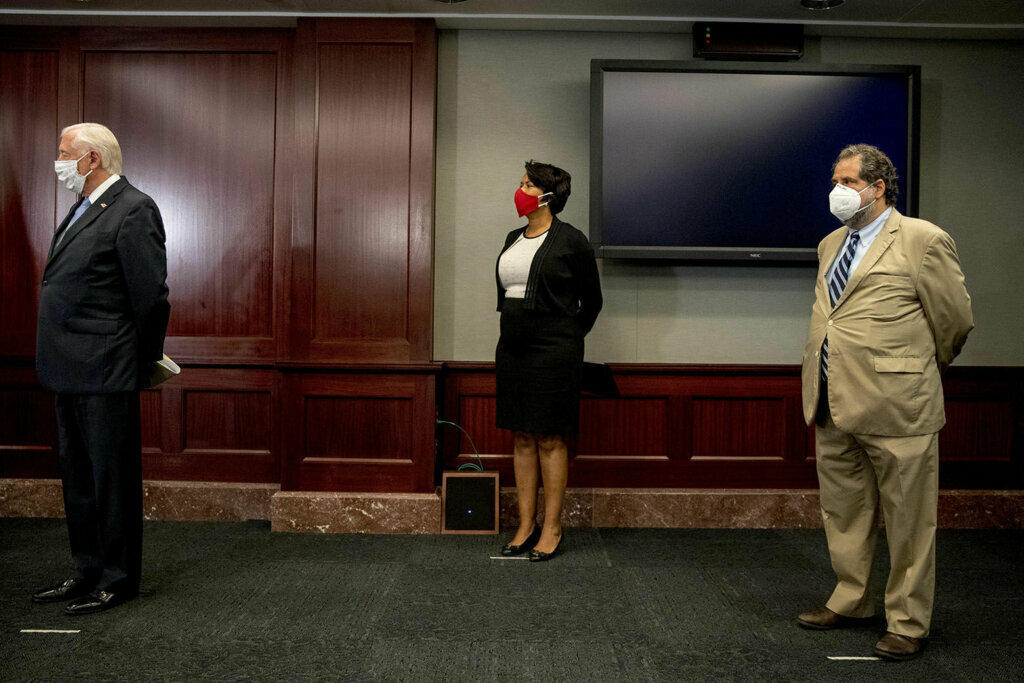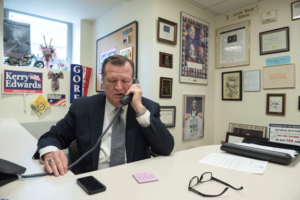
The term “shadow delegation” conjures up all kinds of mental imagery — few, if any of it, pleasant. It sounds like the title of a bad Tom Clancy political thriller rip-off or a conspiracy theory.
In reality, D.C.’s shadow delegation — one shadow representative and two shadow senators — has less power than their Marvel villain-esque designation might suggest.
So what do they do? Who are they?
The short answer: They fight for D.C. residents.
Sens. Paul Strauss and Michael Brown come from a long line of U.S. lawmakers who work to make sure their people are represented, even without statehood.
According to Brown, the “shadow” nickname itself is misleading, if not insulting.
“My official title, as it appears on the ballot and all official documents, is ‘United States Senator,'” Brown said. “The term ‘shadow’ is used by some to indicate that we are not officially recognized by Congress. … The term is never used by us because we see it as pejorative, but it is often used by others when describing my office.”
“If you’re going to look for the term ‘shadow’ anywhere on the ballot, you won’t see it,” Strauss said.
He added that their positions are about as old as the republic itself. “The first ones were elected in 1796 from the southwest territory, which eventually became Tennessee.”
After the “Tennessee Plan” that created shadow offices came statehood for Michigan, California, Minnesota and finally Alaska in 1959.
But despite being founded in 1790, D.C. didn’t vote on its senators until 1990, the first of whom were the Rev. Jesse Jackson and Florence Pendleton, who died on Sept. 10.
“These offices were created after a constitutional convention in the 1980s, where the delegates voted to choose a path towards statehood for the District,” Brown said.
“D.C. residents have been fighting for equality for 200 years. And it took a long time for us just to get the limited privileges we’ve got,” Strauss said.
“It wasn’t until the passage of the 23rd Amendment that we got the right to vote, and could only vote beginning with the 1964 election. We got a nonvoting house delegate in 1971. We got limited home rule, elected government, in ’74.”
As Strauss describes it, the struggle for D.C. statehood and residents’ rights is tethered to the civil rights movement, but for some reason was delayed by the D.C. Council.
“As African Americans achieved a greater degree of political equality, the District began to move towards a greater degree of political equality,” Strauss said.
“And when the rights of African Americans and other minorities and civil rights in general [have] been on the retreat, the rights of D.C. residents correspondingly [have been on] the retreat. So there is a good gap between when the voters demanded that we start electing these positions, and the D.C. Council kept postponing them.”
“I think that was unfortunate, because we missed a lot of time, and we missed a lot of opportunity. We could have been perhaps further along. I do not know why. The council has not exactly been clear as to why they voted to delay them until 1990.”
Are DC Council’s actions hampering the path to statehood?
The gap between home rule and allowing District residents to vote on their senators isn’t the only issue D.C.’s senators have with the council.
Brown said he works in the fight for D.C. statehood “40+ hours a week, 52 weeks a year.”
But neither he nor Strauss is compensated by the District government.
“The D.C. city council took away the salaries after the people created the offices. The council often stands in our way,” Brown said. “For example: Our offices are the only citywide elected offices which are not compensated. We are also the only citywide elected offices not allowed to raise matching funds.”
He pointed out that in 2012, over $200,000 was spent by his opponent in the primary.
According to Brown, he and Strauss would be the only elected offices in D.C., including ANC commissioners, that would not become part of the new state.

“The city council works against us, and I have spent more than $60,000 of my own money in the past 14 years doing this job. For the first nine years, I paid all my own expenses; there was no money allocated at all to support the office,” Brown said.
The D.C. Council has not yet responded to a request for comment.
Right now, opposition to D.C. statehood comes primarily from Republicans, who are concerned that adding two more senators from Washington could tip the balance of power in favor of Democrats.
“There is a small but dedicated group of bona fide opponents who don’t like the idea of statehood for the District of Columbia, because they don’t like the kind of senators that we might send, and how some of those folks might vote,” Strauss said.
“If D.C. had two voting senators during the Kavanaugh hearing, based on the numbers, he would not be on the Supreme Court right now.”
Brown is optimistic about D.C.’s shot at statehood.
“The chances for D.C. statehood are getting better every day,” he said. “We have passed a statehood bill in the House of Representatives with overwhelming support. D.C. statehood is at the top of the Democratic agenda theses days, and even Republicans like Mitch McConnell and Lindsey Graham are talking about D.C. statehood and worrying about the Democrats taking over the Senate.”
Brown theorizes that if the Democrats control the Senate in 2021, the chances for passage of a statehood bill in both houses is good.
“Then all that is required is the signature of the president, and if that is VP Biden, he has told me personally that he favors statehood for the District,” Brown said.
But the blue wing of the political spectrum has its issues too, according to Strauss. They treat D.C. like a prop and “a form of political retribution for what they see as Republican.”
Strauss said it’s about equality and self-determination, not partisan politics.
“But so long as there is a perceived partisan imbalance in how we think, that’s going to be a part of it,” Strauss said. “Our job is to try and educate folks to move away from that.”
Strauss, who has been in office since the 1996 election, is up for reelection in November.
He’s running against Republican Cornelia Weiss and Green Party candidate Eleanor Ory.
“D.C. residents need to know that I’m not going to quit on them,” Strauss said. “I have been in this fight for a long time. Now, we have certainly made progress. 2020 has been a terrible year. But it’s been a good year for the issue of D.C. status. And I’m not going to quit on the people of Washington, D.C.,” Strauss said.
“But my contract is up for renewal. And so they get to decide whether to keep me or fire me. I’m running against two very nice people.”
Puerto Rico, another U.S. territory whose residents are American citizens lacking real representation in Congress, also has a shadow delegation.








